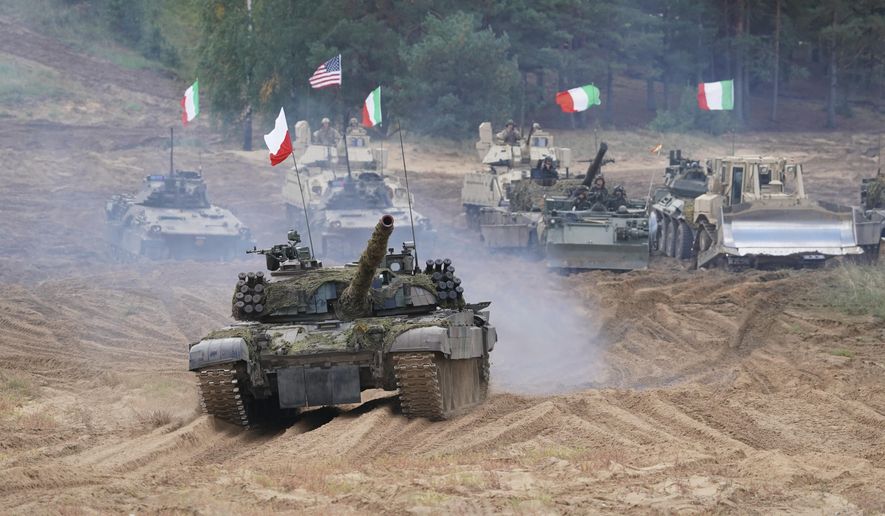The Biden administration warned Moscow on Thursday that Russia risks drawing U.S. and allied troops and arms closer to its borders if President Vladimir Putin goes ahead with an invasion of neighboring Ukraine.
A senior administration official who briefed reporters on the unfolding crisis in Eastern Europe called the buildup of Russian military forces near Ukraine’s border “alarming.”
The latest intelligence assessment still indicates that the Kremlin has not decided whether to go to war against Kyiv in support of pro-Russian Ukrainian forces. “Our sense is they have not made a decision yet,” a senior official said.
“It’s clear to us that if Russia goes ahead with what may be underway, we and our allies are prepared to impose severe costs that would damage Russia’s economy and bring about exactly what it says it does not want: more NATO capabilities — not less — closer to Russia, not further away,” the official said.
Russian military forces have staged exercises and have been massing as many as 100,000 troops, along with tanks and armored vehicles, in areas close to the Ukrainian border. Much of the build-up followed the chaotic U.S. military withdrawal from Afghanistan in August.
Washington and Moscow have talked this week of direct negotiations early next month to address the crisis and a list of security “guarantees” Mr. Putin is demanding of the U.S. and NATO. U.S. officials said Thursday that they were ready for talks provided the negotiations are sincere and reciprocal and will not involve undermining the territorial integrity and sovereignty of Ukraine.
No date has been set for talks, which could be held through a forum called the Strategic Stability Dialogue.
Top Biden officials have said the U.S. and its allies would be willing to discuss some of the Russian demands, but others will “never be agreed to,” the senior official said. Negotiations will not be held in public, the official added.
“We are continuing to monitor Russia’s alarming movement of forces and deployments along the border with Ukraine,” the senior official said.
A small step toward de-escalating tensions was a recent agreement by the Russian and Ukrainian governments to recommit to a July 2020 cease-fire, the senior official said. A separatist war, backed by Russian arms, has taken some 14,000 lives in eastern Ukraine since 2014. The war broke out the same year that Mr. Putin engineered the annexation of the Crimean Peninsula from Ukraine.
Mr. Putin, in his traditional year-end marathon press conference, again painted Russia as the aggrieved party in the face of what he said was a relentless NATO expansion eastward. He demanded that Western governments “immediately” provide security guarantees against incursions. One demand that Mr. Biden and NATO officials have rejected out of hand was a promise that front-line states such as Ukraine and Georgia would never be offered full NATO membership.
Moscow issued a draft treaty this month listing its demands for what is mainly a restructuring of NATO and European security policies.
“You should give us guarantees … and without any delay! Now!” Mr. Putin said.
The Russian leader repeated assertions that U.S. missiles in Europe posed a threat. He was apparently referring to Aegis Ashore missile defense interceptors in Poland and Romania.
“Were we the ones who placed missiles next to the U.S. borders?” Mr. Putin said in response to a reporter’s question. “No. It is the U.S. with its missiles who came to our home and are on the threshold of our home. … Is it an unusual demand? Do not place any more assault systems next to our home? What is unusual about it?”
Watching warily
U.S. intelligence agencies are closely monitoring Russian military moves. Many believe Mr. Putin is seeking Western justification for an incursion into Ukraine. Troubling signals, U.S. analysts say, include the escalating Russian demands, Mr. Putin’s meetings with national security and defense officials, and a phone call last week between Mr. Putin and Chinese President Xi Jinping.
Exploiting another pressure point, Moscow this week reduced the flow of natural gas to Europe through the Yamal-European pipeline to 5% capacity, the lowest level this year.
Russian control over energy resources for Europe is a significant consideration for the United States and allies, the senior official said.
The United States and NATO say they are prepared to act militarily and impose stiff economic sanctions on Russian financial and commercial interests if Ukraine is invaded.
“Our actions will not just be limited to economic actions,” said the senior official, noting likely stepped-up provisions of weapons to Kyiv and changes in force postures. “We’re preparing for any contingency on the assumption that this could happen.”
Asked about Mr. Putin’s reference to U.S. missiles on Russia’s doorstep, the senior official said: “That’s a better question to pose to the Kremlin.
“I could very easily go through a litany of provocative Russian deployment of troops, of offensive systems on the border of NATO-allied countries. I don’t think it is productive to get into that sort of tit for tat.”
Moscow has also been engaged in aggressive disinformation operations seeking to blame Ukraine for the crisis and for spurning a diplomatic process to reach a political compromise in the separatist war.
“We have seen stepped-up efforts by the Russian government to do what it has often done in advance of these sorts of incursions in the past, which is increase disinformation, try to drive a narrative publicly that it is Ukraine that is escalating, as opposed to Russia,” the senior official said.
“To be clear, we see no evidence of that on the Ukrainian side.”
U.S. allies and partners have been told that “this is Russian disinformation,” the senior official said.
• Bill Gertz can be reached at bgertz@washingtontimes.com.




Please read our comment policy before commenting.